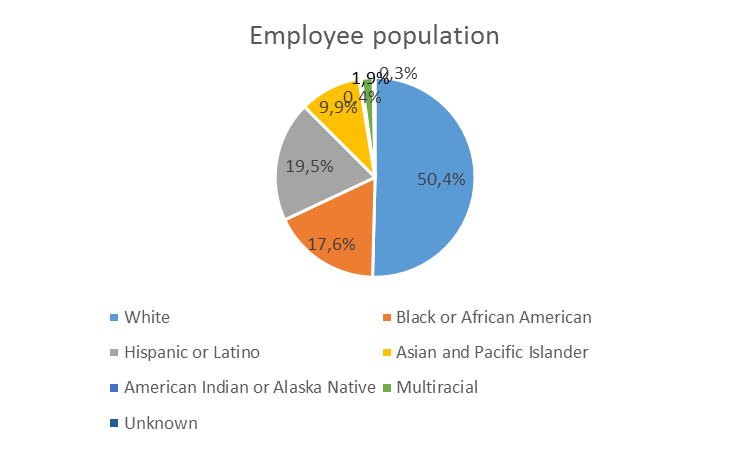The US society has always been highly diverse in terms of culture. At present, the number of people having different backgrounds is growing at an unprecedented pace, which poses certain challenges to the public health sector. Buckle (2015) notes that extensive research shows that the majority of patients pertaining to ethnic minorities think that their cultural needs were ignored during their stay at a hospital. The diversity issues could be addressed more effectively through the increase in employees’ diversity in the US hospitals. Morrison and Oladunjoye (2012) argue that the number of healthcare staff pertaining to ethnic minorities is insignificant (13%), and these people occupy non-leadership roles. Many hospitals have acknowledged the benefits of a sound strategy aimed at managing cultural diversity issues. For instance, Patrnchak (2013) reports about a successful experience at a Cleveland Hospital where cultural diversity of employees was seen as a strategic goal of the facility’s development. Healthcare facilities choose different ways to achieve cultural diversity among employees.
Florida Hospital Carrollwood has made cultural diversity one of the components of its mission. At that, the diversity of patients, the staff as well as visitors and colleagues is valued (Our mission and philosophy of care, 2016). The hospital’s staff is quite diverse as almost 50% of employees pertain to cultural minority groups (see fig. 1). Nonetheless, the distribution of roles in the hospital is quite disproportionate as minority groups mainly occupy non-leadership posts. For instance, 89% of the hospital’s board are Caucasians while 70% of nurses are Asian/Pacific Islanders (Moving forward together, 2011). Clearly, the underrepresentation of minorities in various positions negatively affects the development of the facility.

Florida Hospital Carrollwood has a sound strategy to address culture-related issues. The focus on employees’ empowerment is seen as a strategic goal that can help the hospital ensure true cultural diversity among employees (Moving forward together, 2011). Thus, employees are encouraged to work in cross-functional teams and take up leadership roles. Employees training is also seen as a way of empowerment as well as the development of the staff. On-job training, workshops, discussions, conferences serve as a platform for sharing knowledge and experience. At that, employees are also encouraged to obtain higher degrees from medical schools. It is necessary to add that the hospital pays significant attention to the development of cultural awareness. Douglas et al. (2011) claim that on-job training has proved to be effective as employees develop important skills and knowledge improving their performance as well as motivation. Employees learn about different cultures, which equips them with the necessary knowledge to address patients’ needs and develop proper communication patterns with colleagues.
Effective communication is also seen as an important background for achieving culturally diverse workforce. The hospital has a set of communication channels that include various forms of face-to-face and written communication, as well as digital communication. As has been mentioned above, employees interact in groups and share experiences during different meetings (weekly meetings, workshops, and conferences). The written communication is held through various written communication forms (reports, memos, and so on). The digital system includes the corporate mail and database that can be used to share information, knowledge, ideas, experience, and so on.
On balance, it is possible to note that Florida Hospital Carrollwood has a sound strategy as regards the development of a culturally diverse workforce. The employees are trained and encouraged to take up leadership roles. This empowerment and training is a part of the hospital’s vision and mission, which allows the facility to meet the needs of the community.
Reference List
Buckle, S. (2015). Impact of cultural diversity in inter professional practice and patient centered care. Journal of Anesthesia & Critical Care, 3(5).
Douglas, M., Pierce, J., Rosenkoetter, M., Pacquiao, D., Callister, L., Hattar-Pollara, M., … Purnell, L. (2011). Standards of practice for culturally competent nursing care: 2011 update. Journal of Transcultural Nursing, 22(4), 317-333.
Morrison, J., & Oladunjoye, G.T. (2012). An analysis of perceptions of hospital administrators for enhancing cultural diversity: A view of two perspectives. International Journal of Diversity in Organizations, Communities & Nations, 11(6), 49-62.
Moving forward together. (2011). Web.
Our mission and philosophy of care. (2016). Web.
Patrnchak, J.M. (2013). Building an engaged workforce at Cleveland Clinic. Journal of Healthcare Leadership, 5(6), 9-20.